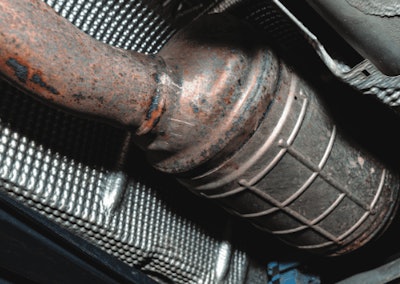
KEEPING RECORD
British Columbia has introduced regulations around the sale of catalytic converters in effort to curb the crime that reportedly costs the Insurance Corporation of British Columbia (ICBC) millions every year.
As of March 14, the province now requires buyers to report each transaction, including seller information, straight to police. Catalytic converters thefts in B.C. have climbed from just 89 instances in 2017 to 1,953 reports in 2021, totalling more than $4 million in claims costs for the year, said ICBC.
Prior to the new regulations, catalytic converters could be sold to metal dealers
without providing information about the seller, allowing them to remain anonymous

Prior to the new regulations, catalytic converters could be sold to metal dealers without providing information about the seller, allowing them to remain anonymous
PUMPED PRICING
Budget reforms in British Columbia may impact the used vehicle market sooner than expected, according to a disgruntled official opposition critic.
Starting October 1, private vehicle sales will be taxed based on the vehicle’s reported purchase price and the average wholesale value. This tax will apply to the greater of the two values, according to the budget change announcement on the B.C. government’s website. This approach is “intended to address tax avoidance arising from the underreporting of the price of motor vehicles from private sales,” according to the province’s 2022/2023 fiscal plan.
In an interview on the Mike Smyth Show, Peter Milobar, a member of B.C.’s legislative assembly said, “you will have to pay a value that the government will deem that the car is worth.”
At the time of writing, used zero-emission vehicles and vehicles purchased by First Nations individuals, the Federal government and domestic or foreign diplomats are exempt from this policy change.
CREDENTIAL CRACKDOWN

As part of this new legislation, the Industry Training Authority Act will now fall under the umbrella of SkilledTradesBC and require workers to register as an apprentice or be a certified journeyperson to work in one of the 10 recognized mechanical, electrical and automotive trades.
The requirements will be implemented in phases between 2022 and 2024 and will provide workers with a year to register as an apprentice or earn some sort of journeyperson certification.
The initial phase of this plan will involve workers in mechanical and electrical fields, as well as automotive sector workers, including heavy-duty equipment technicians, automotive service technicians and autobody and collision technicians.
In February, the Industry Training Authority hired five new apprenticeship advisors and received a $5 million government investment to improve B.C.’s skilled trades landscape.





















